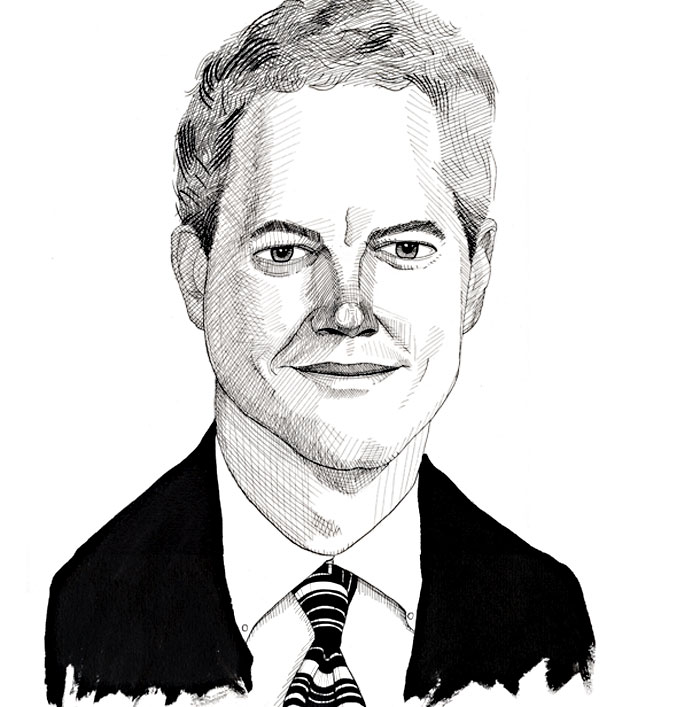By 8 a.m. last Tuesday the 24th, hearing room A at the John L. O’Brien building in Olympia was filled to capacity. The House Finance Committee was meeting to discuss a long list of bills creating new taxes and fees for struggling government agencies. Outside the room, a gaggle of people angled for the sign-up sheet and the chance to speak out in favor of funding everything from cultural centers to a state-wide 911 system.
One of the bills the committee was scheduled to hear testimony on was HB 2249, which would authorize King County and the cities within it to levy several new taxes, some without voter approval. State Auditor Brian Sonntag was one of several people testifying in support of the bill. He looked up from the table at committee chair Ross Hunter (D-Medina), who introduced the bill and is its sole sponsor. Hunter, he observed, “is daring to go where no one has ever gone before.”
Hunter laughed. “If the staff could cue the Star Trek music now,” he quipped.
Hunter is the master of hearing room A. When he makes a joke, the assembled quickly respond with laughter. When he tells a long-winded witness to cut it short, they do. Hunter is also the man that King County is counting on to save it from its budget mess. Facing a $93 million deficit, the county says it needs new taxes or it will cut essential social services. Last October, King County Executive Ron Sims drew up a list of these—such as the mental health court and the White Center Family Planning Clinic—called them the county’s “life raft,” and declared it would sink if the legislature didn’t come through with more taxing authority. Now that raft for the county’s most disadvantaged is in the care of a state representative from the ritziest neighborhood in Washington, whose constituents include Bill Gates.
With Sims headed to D.C. soon to become Deputy Secretary at HUD, county council members are the ones lobbying Hunter. Ironically for council members like Dow Constantine and Larry Phillips, who’ve both declared their candidacy for Sims’ job, Hunter may also be their competition in November.
Hunter, a former Microsoftie himself, has been chair of the House Finance Committee since 2007. In a year when nearly every local government is having trouble paying for the services it provides—from cops to clinics—everyone needs something from Finance, which has to approve all new taxes. Hence the packed committee meeting last Tuesday.
King County lobbyist Chuck Williams says he and county representatives worked with Hunter to create what eventually became HB 2249, which would allow King County to raise money through a variety of potential taxes and fees. It would also give a slice of city sales-tax revenues to the county to keep up unincorporated areas such as White Center—places that haven’t been brought into any municipal fold and so are the county’s responsibility.
Hunter admits the bill in its current form won’t pass. The Association of Washington Business and the Washington State Association of Water and Sewer Districts are already lining up to oppose portions of it. Neither wants to see taxes added to their cost of doing business or their customers’. Hunter says the bill as it exists is a jumping-off point for negotiations, and he expects it to change dramatically in the coming weeks.
Hunter has also been going to bat for the city. He currently co-chairs a legislative task force to determine possibilities for remodeling KeyArena in the hopes of attracting a new NBA team. Hunter says he won’t use state money for the project, but did offer to craft a bill that would allow Seattle to levy a city-wide tax to pay for the project. The city declined, but the deal isn’t entirely dead. Hunter has kept a bill sponsored by Eric Pettigrew (D-Seattle) alive in his finance committee. The bill itself contains only a name—the visitor destination campus act of 2009—but keeps the issue on the table in Olympia if the city manages to come up with a plan to finance a remodel that doesn’t involve using state money, Hunter says.
With his hands in so many pots, Hunter has generated buzz about a possible run for Sims’ seat. He doesn’t rule out the possibility. “It’s certainly something I would consider,” he says, adding the always-politic “but right now I’ve got a job to do.”
Lawmakers aren’t allowed to raise money while the legislature is in session, which means Hunter wouldn’t be able to start amassing funds until at least the end of April. Meanwhile Phillips says he’s already raised more than $120,000 for his shot at becoming Executive. But Phillips’ campaign won’t be helped if the bill to save the King County budget doesn’t pass, so he’s been spending a lot of time working with Hunter to make it happen. Phillips says he doesn’t worry about running against Hunter as long as King County comes up with a way to save itself.
“I’m happy at the end of the day to see bills passed that are signed by the governor. The politics will sort itself out,” he says. But Phillips is quick to add a dig at the much younger Hunter: “I certainly have greater breadth and depth in county government than anyone in the state legislature.”
Hunter, who retired from Microsoft in 2000 at the age of 39, was first elected to the state House in 2002. He was actually drafted into the race by a Republican, then–King County Council member Rob McKenna, with whom Hunter served on the board of the Bellevue Schools Foundation (which raises money for the school district to supplement public funds).
McKenna says Hunter clearly had ambitions for public office, so he sat him down and asked if he was interested in running to replace Republican Luke Esser, who had given up his 48th Legislative District seat to run for the state Senate. “I was surprised by how bright he is,” McKenna says. McKenna had wanted Hunter to run as a Republican, but “it became quickly apparent that he’s left of center.”
Hunter ran for the seat as a moderate Democrat and won. It was a tight race in a district that had previously elected only Republican reps. Coming out on top that November earned Hunter instant star power in the party. “As a group we were highly elated, we’d finally broke the barrier,” says Dick Gidner, then–Democratic party chair in the neighboring 41st District, which also went blue for the first time that year.
Hunter was re-elected in 2006. With his proven ability to get Eastside support, some Democrats lobbied for him to take on Dave Reichert last year, in place of Darcy Burner. King County Democratic Party Chair Susan Sheary led the effort. “We wanted someone who had won political races before,” Sheary says. “Darcy Burner had already run once and lost.” But the effort was derailed when Hunter’s non-Hodgkin’s lymphoma, for which he received treatment in 2005 and 2006, recurred. He’s currently cancer-free, and Sheary wants him to take a run at it again.
In the legislature, Hunter started out working on education, and still serves on the House Education Appropriations Committee. In 2004 he pushed for and won a close fight to lift caps on school district levies. But it quickly became apparent that Hunter had a head for numbers—he started dropping nuts-and-bolts tax-policy bills, including one to streamline sales taxes and improve collection of telephone excise taxes.
Hunter has a fiscal-conservative streak. According to the Montana-based Center for National Independence in Politics, he voted in step with the Washington Conservative Union 25 percent of the time his first year in office—though that number has fallen off since. Between that and his association with people like McKenna, some fellow Dems refer to Hunter as a “Republicrat” behind closed doors.
The reputation could actually help, delivering votes that people like Phillips and Constantine might struggle for beyond Seattle’s borders. “We couldn’t elect a Seattle liberal in those [Eastside] districts, but we can elect moderate Democrats pretty consistently now,” Gidner says.
Hunter may have trouble maintaining that center-left reputation after this legislative session. Despite floating the legislation to axe state spending on all boards and commissions, his proposal to salvage King County’s budget relies heavily on increasing the county’s ability to tax residents. One of those proposals, a utility tax to help the county cover the cost of maintaining unincorporated areas, has opposition from people in his own party. Gidner is now a King County water district commissioner. He says the tax creates too high a burden on people hooked up to water and sewer lines, and if it stays in King County’s bill, he and his fellow commissioners will oppose the whole thing.







